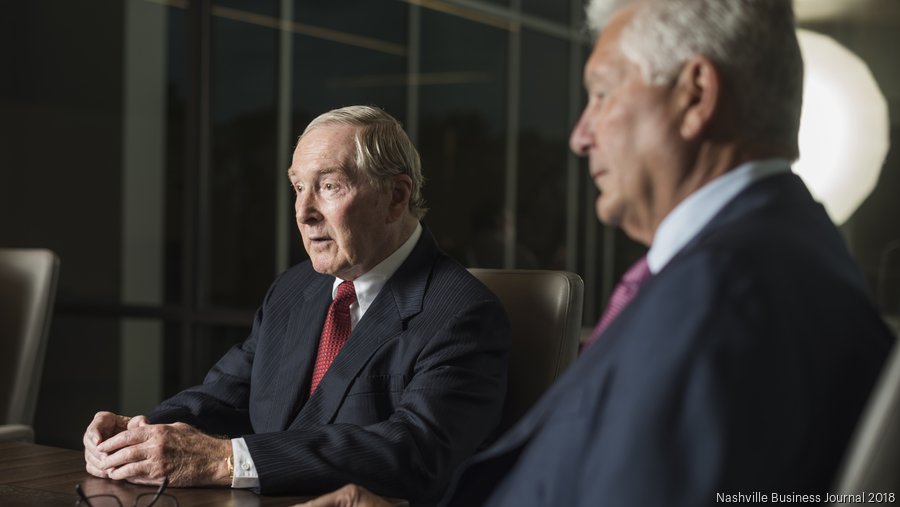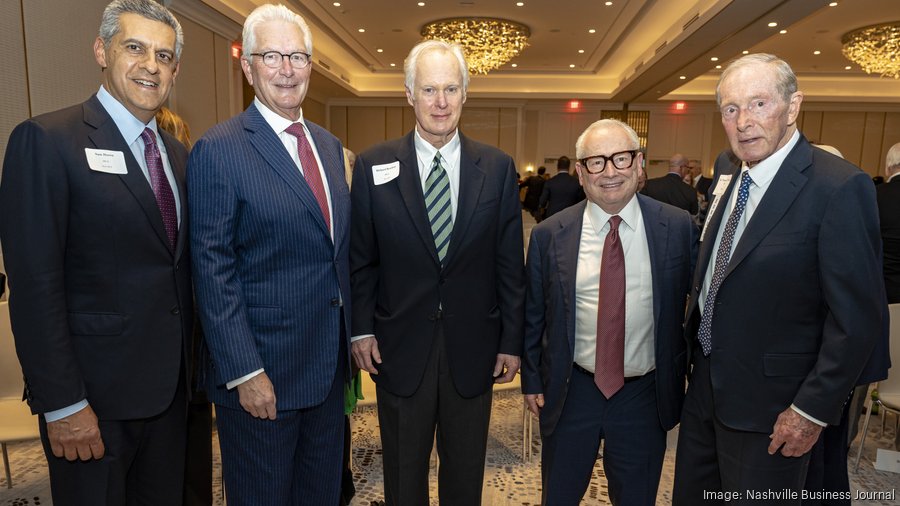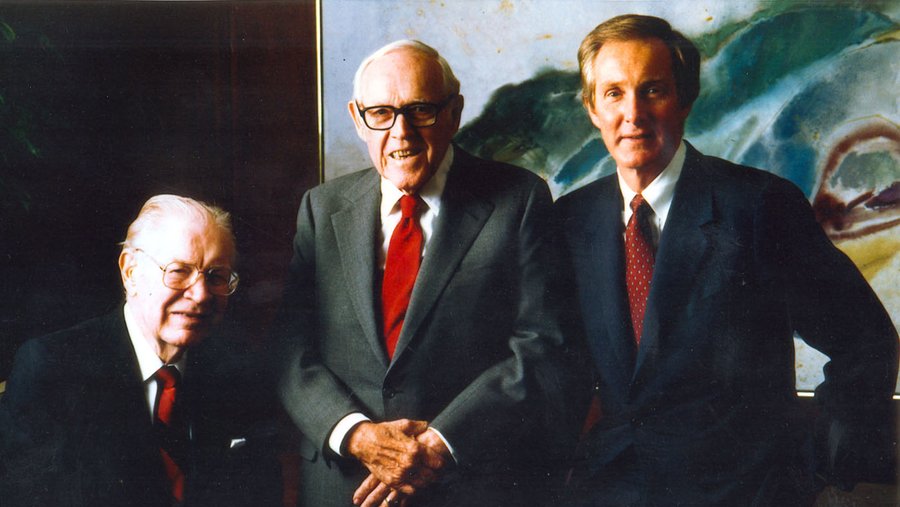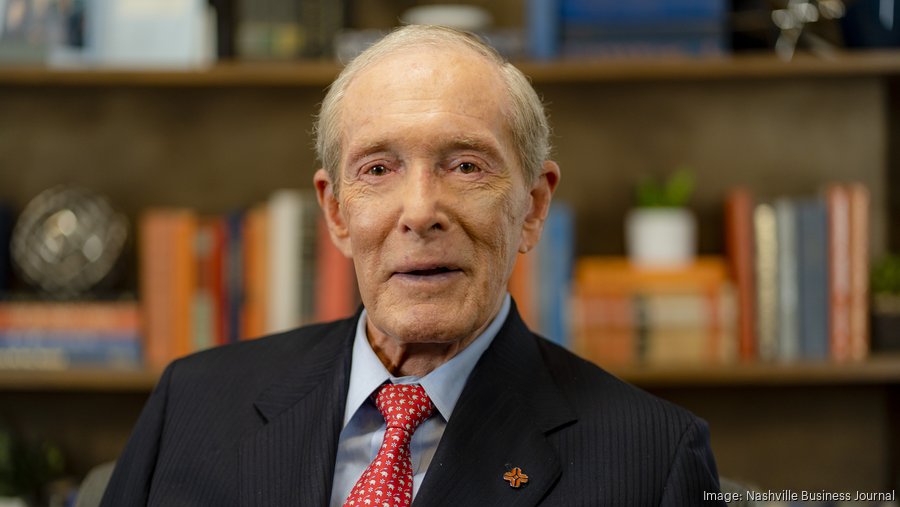Listen to this article 12 min
Dr. Tommy Frist Jr. is known for revolutionizing health care, but the 84-year-old may have also pioneered something that’s as popular with college students today as TikTok or avocado toast: the “gap” year.
Decades before Gen Zers began taking semesters-long sabbaticals from school and years prior to Mark Zuckerberg orBill Gates dropping out of college to launch startups, Nashville’s most successful businessman walked away from Vanderbilt University in the middle of his college career.
“Being the first of five children, Dad really worried that his first son had dropped out of school,” said former U.S. Sen. Bill Frist, Tommy’s younger brother by 14 years. “He had left school because he was an entrepreneur. … This is a really important part of his early life. He was a serial entrepreneur before we really knew what that meant.”
Frist eventually returned to Vanderbilt, but in the interim, he began a business selling advertising space on desk blotters, which would sit on the lobby desk inside freshman dorms and advertise local businesses to new students. In the coming years, he also launched a trampoline park business, before founding HCA Healthcare Inc.in 1968 alongside his father Dr. Thomas Frist Sr. and businessman Jack Massey – unofficially launching what is today a $95 billion health care industry in Nashville, with more than 500 area health care companies, employing more than 328,000 people.
From a $5.25 million investment, HCA quickly grew, posting $29 million in revenue in its first year and going public on the New York Stock Exchange. Frist, a former Air Force flight surgeon, was CEO of the company twice and chairman of the board when HCA orchestrated a $33 billion leveraged buyout in 2006, the largest in history at the time.
Today, HCA (NYSE: HCA) is Middle Tennessee’s largest publicly traded company, according to Nashville Business Journal research, with nearly 11,000 local employees and $58.75 billion of revenue in 2021. The company operates 182 hospitals across 20 states and the United Kingdom, more than any for-profit hospital operator in the U.S.
But some of the key principles Frist used to make HCA successful were those he learned during his time away from school, his brother said. He grew his desk blotter advertising business to 111 universities throughout theU.S. by flying his two-seater Stinson airplane from community to community, much like he would later do at HCA to scout or buy hospitals, building his empire.
“He said, ‘The only way I can make money [advertising on desk blotters] is to do it in 50 places or 100 places,’” Sen. Frist said. “He took things to scale. It was an example of understanding scale: When there’s one hospital, that’s good. But let’s now take it to 300 hospitals. … They were good learning experiences.”
Because of his unprecedented impact on the city’s economic landscape, as well as his philanthropic efforts and personal business success, Tommy Frist was honored this week with the Nashville Business Journal’s Most Admired CEOs Legacy Award.
We recently sat down with the legendary entrepreneur to learn what aspect of health care today needs to be fixed, what he misses most about being a CEO and what kind of business he would launch today if he were a young entrepreneur. The following Q&A has been edited for length and clarity.

When you look at Nashville and the way you, your family and HCA have influenced it, what are you most proud of? That we’ve played a role in improving the lives of others. Giving back money to worthwhile causes, but also just attracting good people into Nashville.
When you talk to your children and grandchildren about how the Frist name should be carried on in Nashville, what do you tell them? I tell them that it’s hard to be a Frist. You have to run a little bit faster, walk a little bit faster, because the expectations are greater of somebody that has the Frist name.
When you look back at the early days of HCA, what’s your favorite story to tell about building HCA? I don’t have any favorites. The whole life is such a rush, exciting. One of the neat things is we’ve been able to take the blessings of what HCA has been to the family and address issues that might not otherwise be addressed in the community. It could be an art center, it could be the Nashville Zoo, it could be a whole host of things, and hopefully you bring a little value added to the city.
Is that how you have thought about your life, finding ways you could add value to the city or to people? Absolutely. I’ve been very goal-oriented my entire life. From the time I was a child, I set personal goals. From daily goals, to weekly goals and stretch goals that may be over several years.
Did you learn that from your parents? No, it came natural. I like to win.
If your father and Jack Massey could see HCA now, what would they think about it? I think you could ask the same question about Nashville itself: They wouldn’t recognize it. They would think they were in Atlanta or Dallas or somewhere else. Same way with HCA. There’s no way possible, no matter how much you’d like your dreams to come true, they wouldn’t recognize HCA. They’d be very proud of it, very pleased.
The Legacy Award, to me it’s an award really not to me, but to [former CEOs] Jack Bovender, Richard Bracken, Milton Johnson and now [current CEO] Sam Hazen. It’s kind of remarkable, if you throw me into the mix, to have five people over 55 years really put their imprint on the city, the state and on health care in general in this country.

One of the stories I’ve heard several times is that you would meet with CEOs new to town, welcome them, help them get acquainted and gently let them know that Nashville is a philanthropic city. If you were to walk into a Nashville CEO’s office today, what advice would you give? It’s even more important today to surround themselves with the best people possible. They can’t do it alone. In fact, they need people better than themselves to give them the ability to go out and achieve things that alone they just couldn’t do.
As Nashville has grown, do you think that sense of civic responsibility remains with today’s business leaders? I think so. I think with the new investment in this community by [new-to-town] companies — I don’t even know them all. Amazon and various others, it’s very important that they assimilate. I think they’re trying, from hearing and seeing bits and pieces. [It’s important] that they truly adopt this city as an important part of their corporate culture if they want to achieve their potential.
What are you most excited about for the future of HCA? You asked about my father and how things would be like for him to come back and see they way HCA is today. He came up in a time when penicillin was discovered. They didn’t have typewriters. … [O]ver the coming years, we’re just starting to see a change in areas such as the nervous system. … Artificial intelligence will impact all of our lives, including our health. Having an entrepreneurial spirit in a company that is 55 years old is extremely important, and it’s important not to lose it, therefore you get the best people. Give them encouragement and the ability to go out and do things, then you reward those who are successful.
Those who don’t quite make the cut, we did pretty well with spinning them out and creating another company. [The HCA family tree] is a pretty good network of companies. I’ve never fired a person in my life: You’ve got to spin them out into other companies. They all were successful, but they weren’t up to where I felt that they should be. I didn’t have the guts to fire them.
That’s part in jest, and part in truth.
Does financial success come with an obligation? If so, was that instilled in you or was it common sense to you? It’s not an obligation. It’s an opportunity to do good in the world and make the world a little bit of a better place. That starts with a parent who tells you to put a dime in the collection plate at church. You get in that habit, you grow up and all of a sudden you’re in a position where you have a little money from your business in college and you remember tithing. You give a little money back to your prep school, which I did to Montgomery Bell Academy, and [that]gives a great feeling of satisfaction to a 23 year old. You all of a sudden have a company a few years later that builds on itself.
Most of my time and effort right now goes toward setting up new foundations: Who’s going to staff them. What they’re going todo, what’s their mission. It’s kind of neat to see, each one of the children and their spouses are on The Frist Foundation board, which is a $556 million foundation that gives away$40 million to $50 million a year, and it’s all tied to Middle Tennessee.
[My parents] didn’t have any money. They gave their time to certain things. My father was a successful doctor, but doctors didn’t make much [back then.] So, they weren’t role models in giving away money but they gave away their time and effort. One way or another, they were giving back.
Do you still set goals for yourself? Absolutely. Every day of my life I’ve set goals. Some are relatively small and others are larger in size. … Goal setting is still an important part of my life. They are a little bit different types of goals, not around a company but around other things in my life. … What keeps me going and interested now are [foundations] that have a mechanism in place … for the second and third generations to have about $150 million to $160 million apiece. They will determine what the use of those funds will be, and they will not be limited to Middle Tennessee.

If you were a young entrepreneur today, what kind of business would you start? It would be a health care company. Why am I so sure of that? Back when we first started HCA — Mr. Massey, my father and I — Massey tried to get me to go into several other businesses instead of practicing medicine. I would always come back to say, “No, I [don’t want] to do something with chicken or a bank.” I wanted to do something in health care. Something that would make a difference. Today, 55 or 60 years later, if I were starting a company, I would start it in Nashville, Tennessee — the health care capital.
When you look at the U.S. health care system today, what do you think is going right and what do you think needs to be fixed? What’s going right is the greatest quality of health care and access to health care in the world. … The biggest positive is the quality of health care that is available. The thing that needs to be helped, and has been a problem all my lifetime, is an adequate payment system. It’s good, but there are too many individuals in this country who’ve fallen through the cracks. We need better solutions. [We need] universal health care. … It depends what type of universal health care, [not single payor]. Everyone in this country ought to have access to health care.
You were CEO of HCA twice; what do you miss the most about being a CEO? Working with a great team of managers who want to leave the world a little bit of a better place.




